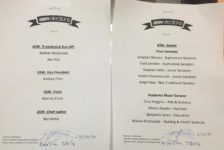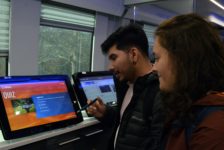
Members of student government raise their hands to approve a measure proposed in Senate meeting. Once passed in Senate, most motions must also be passed by the student body. Photos by Madison Wood
The term “student government” might conjure memories of cheesy handcrafted posters hanging in high school hallways. Yet, sitting in a Westminster Senate meeting on a dark Monday night, students may find themselves taking student government a bit more seriously.
“Student government is important because it provides a meaningful voice for students and their interactions with administrators,” said James Steur, speaker of the Senate and political science major. “It also provides the ability for specific students to grow in ways they normally would not.”
During Senate meetings, Steur and other members of the branches of student government (the Executive Cabinet, the Judicial Council, the Inter Club Council and the Student Activities Committee) gather to discuss topics of student interest.
All students at Westminster College taking more than two-credit hours are automatically a part of the Associated Students of Westminster College (ASWC), which is led by the student government. However, that doesn’t bring in the crowd to Senate meetings.
“Senate always has a low public student attendance—that’s just historically what it’s been,” Steur said. “But with bigger topics, there can be an influx of students.”
To fight low student attendance at meetings and lack of knowledge about student government, ASWC recently proposed changes to the organization’s structure. Along with a new visual identity, the branches under ASWC will change names, according to ASWC’s website

Jane Jerman, ASWC vice president, waits for the Senate meeting to begin. Senate meetings are used to discuss and support student interests; meetings happen once a month on Monday nights and are open to the public.
Students will be able to vote for the changes on Nov. 18–19 on Canvas.
“With the identity rebrand, your student government aims to eliminate current confusion and establish a strong identity that Westminster can be proud of,” said ASWC in a message on its website. “We aim to create consistency and strengthen ASWC for future students.”
ASWC members said the Westminster community is unclear on what student government does, how it’s structured and who is involved.
“Since every student of Westminster is an “Associated Student,” it is of everyone’s interest that we are represented in a clear and concise way,” said the ASWC online message.
If the identity rebrand is approved by the student body, ASWC members hope it will get students more involved in the processes of student government.
“Having students at Senate demonstrates that they’re interested in the process, which is really important,” he said. “But it also allows senators to engage and discuss things with one another that we normally wouldn’t.”
As Steur puts it, “It really only takes one student’s voice to potentially direct the whole meeting.”
Students who choose to get directly involved with student government will also be rewarded, according to Steur.
“You take a first-year student who got involved in student government and see them two or three years later, and I think they attribute a lot of their growth to it,” Steur said. “Things like, ‘I really needed to learn how to communicate effectively with administrators’ or ‘I needed to understand how the school worked better’ or ‘I learned specific things about myself, like maybe I’m disorganized.’”
In addition to interpersonal growth, student government members also get opportunities to coordinate impactful communication and events.

Graphic by Madison Wood
“It’s looking like Women’s History Month in March will be a go, so that’s really exciting to me, obviously,” said Jane Jerman, vice president of ASWC and communication major. “Also, there’s so many organizations on campus that are really, really, really stoked to get involved with it.”
Jerman has coordinated with Financial Aid, Student Health Services, the Alumni House and the Center of Entrepreneurship to accomplish this goal.
“For me, one of the things I’ve really gotten out of it was learning to work with people in really difficult situations,” Steur said. “Senate is composed of so many different people… I’ve really learned to take people with different opinions and put them in a room together to have a conversation and constructive dialogue with one another instead of actually just screaming at one another and not making progress. That’s a huge thing to be able to do. To be able to construct questions and make a space where that can actually happen.”
But for Christian Anderson, junior communication major, that’s not enough to get him to go.
“I’m not really interested in getting involved,” Anderson said. “I mean, my high school was bigger.”
In the end, it could be the lack of information that hurts attendance.
“I would maybe go if I knew more about what it entails, but I don’t really know the purpose of going,” said Jake Smith, junior communication major. “I’m not even aware of where or when Senate meetings take place.”









